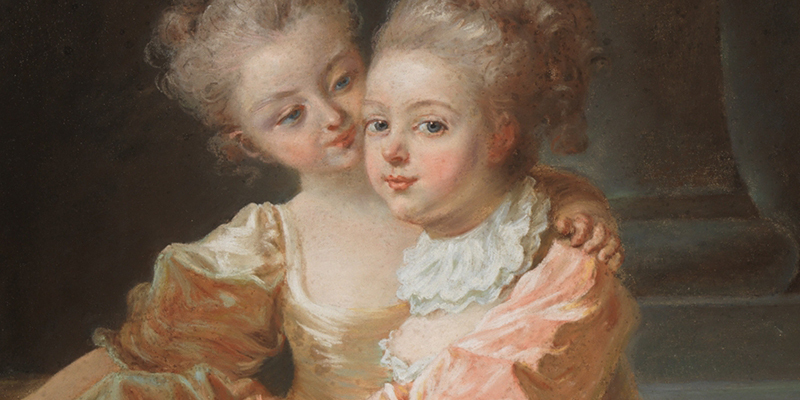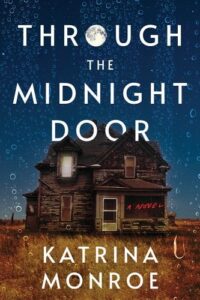Sister: I just finished reading your book.
Me: Yeah? What did you think?
Sister: …are you okay?
A good friend once suggested that writing a book is like an exorcism. Being a horror novelist, I agreed immediately and enthusiastically. Looking back at my previous releases (They Drown Our Daughters and Graveyard of Lost Children), I couldn’t help but see the truth in her words. They were exorcisms of baggage. Of mommy issues. It only made sense that my newest, Through the Midnight Door, was also an expulsion of a different kind of demon.
I’ve often said that Midnight Door is my love song to sisters. It is that, but it is also a kind of reckoning. Like Meg, one of the main characters in the book, I am also an eldest daughter. If you believe the millions of TikToks on the subject, being an eldest daughter comes with a host of responsibilities and personality glitches that follow us into adulthood like cans kicking behind a car. I always find myself nodding along.
Put a finger down if you feel responsible for everyone in your life.
Put a finger down if you’re a former “gifted” kid.
Put a finger down if you’re now on anxiety medication (or wish you were).
Put a finger down if you’re a people pleaser with zero boundary control.
Put a finger down if you’re drowning in guilt.
The list goes on and on.
Being an eldest daughter also often means being the back-up parent, the bonus mom, especially if younger siblings are significantly younger, like some of mine are. To preface, I love my siblings. I am especially close to my sisters, one of which I used to bring to gymnastics lessons (and to Sonic for mozzarella sticks and slushies afterward) and taught her how to drive. I am grateful for the bond that resulted from all that time together, if I’m honest, the situation wasn’t exactly fair.
The tables turned during what I lovingly call my “disaster lesbian years” when I spiraled (dropping out of college, moving across the country to live with someone I’d only ever interacted with on the internet) and, instead of holding my role as bonus carer and big sister, I relied on their help, monetarily and emotionally. It was humiliating and, to this day, what I think of as my greatest failure.
Without giving away spoilers, in Through the Midnight Door, Meg and Esther both hold feelings of guilt for a tragedy in their childhood, but it’s Meg who carries the bulk of the weight. Having to hold the position of “bonus mom” at a young age, she was (and is) responsible for her sisters’ safety and well-being. Then, when their younger sister, Claire, dies, it becomes almost too much to bear. And though Esther’s grief is just as painful, it isn’t in her nature to assume responsibility the way it is Meg’s.
This difference of perspective is what drives the wedge deeper between them. Being a middle child, Esther feels emotionally separated from her family. She is the only one to have moved out of Blacklick, the only one to have gotten married and started her own family. She is stubborn and anxious to stay out of Meg’s shadow, seeing Meg’s self-flagellation in the wake of Claire’s death as attention-seeking.
As Esther looks outward to place blame, going so far as to demand an investigation into what is, to police, an apparent suicide, Meg brushes these efforts off as a waste of time. Why go looking, when the one responsible was right here? In her pain, Esther begins to agree, which only makes sense to Meg, pushing the sisters even further apart.
In writing through Meg’s guilt, I hoped to exorcise the blame I’ve felt for a number of things that I won’t list here and will instead save for therapy (you’re welcome). I don’t know that I accomplished that, but in writing through Meg, Esther, and Claire’s eyes, I was able to put myself in the position of seeing the perspective of not just an eldest daughter, but a middle and youngest, too. No matter what was said in the heat of the moment, neither Esther nor Claire would want Meg to torture herself over events she didn’t have any real control over. It’s a lesson I’m struggling to learn. Luckily, I have (forgiving) sisters who remind me.
The most important thing I hope readers take away from Through the Midnight Door is the idea of forgiveness, not just of others, but more importantly, of self. Even eldest daughters (as much as we want to think otherwise) are not perfect. Clinging to blame and blowing up walls built for our own protection doesn’t just hurt us, but the people we bend over backwards to care for.
In the end, all that really matters is sticking together, plunging through the darkness without losing sight of each other to find the light on the other side.
***


















